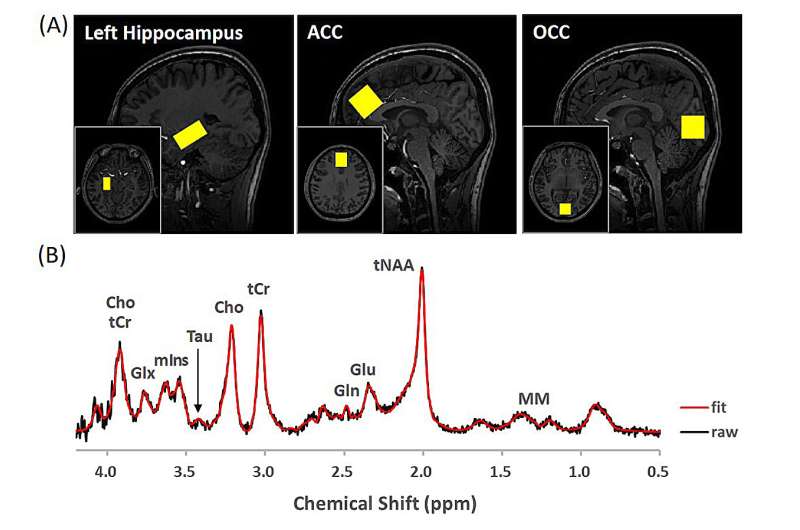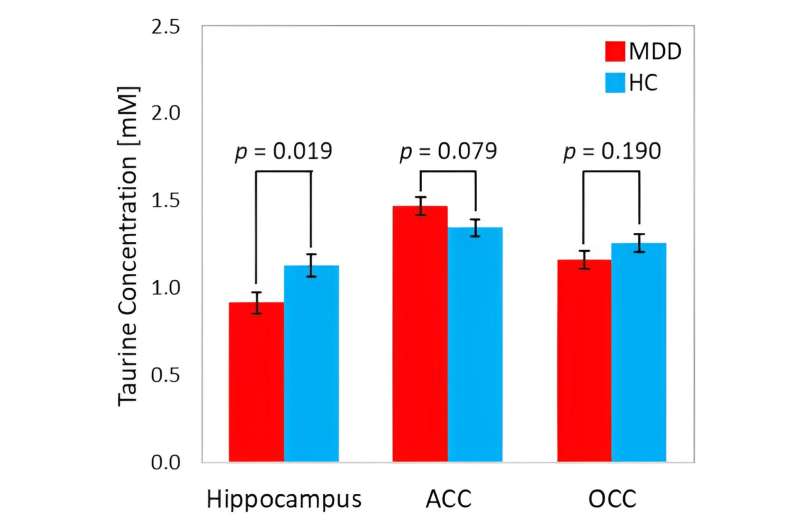This article has been reviewed according to Science X's editorial process and policies. Editors have highlighted the following attributes while ensuring the content's credibility:
fact-checked
peer-reviewed publication
trusted source
proofread
Study finds women with depression have 20% lower taurine concentration in the hippocampus

For the first time, a research team in Korea has discovered there is a significant relationship between depression and the taurine concentration in the hippocampus, an area of the brain responsible for memory and learning functions. This discovery provides the opportunity to publicize the role and importance of taurine in future prevention, diagnosis, and treatment of depression.
Using ultra-high magnetic field 7T human MRI (7T MRI), researchers (Drs. Youngkyu Song, Jee-Hyun Cho and Chaejoon Cheong) at the Korea Basic Science Institute (KBSI) Biochemical Analysis Team have confirmed that the taurine concentration was significantly lower in the hippocampus of young females suffering from depression. The study was published in Biological Psychiatry.
The study, conducted in collaboration with research teams led by Dr. Hyungjun Kim at the Korea Institute of Oriental Medicine (KIOM) and Prof. Jin-Hun Sohn at Chungnam National University (CNU), compared two groups of female participants: a group of 36 female patients with major depressive disorder, and a control group of 40 healthy females. All participants were aged 19 to 29.
Depression is a disease that causes serious damage and loss, not only personally, but also socially and economically. According to the World Health Organization (WHO), there are more than 260 million people suffering from depression around the world, and more than 800,000 people take their own lives every year.
In Korea, the increase in depression among young people is notable. Of the total 1,000,744 patients with depression, 185,942 individuals in their 20s accounted for the largest demographic, and the rate of increase has more than doubled in five years.
MRI is widely used in brain disease research as it can precisely scan specific locations in the body and obtain a variety of quantitative information. Previous MRI studies on depression have focused on revealing changes in metabolites mainly limited to the cerebral cortex area, at the edge of the brain. This study is the first to disclose the relationship between metabolites and depression in the hippocampus, located inside the brain.
To identify substances closely related to depression, the research team measured and compared concentrations of seven metabolites, taurine, choline, creatine, glutamine, glutamate, myo-inositol, and N-acetyl aspartate, present in the frontal, occipital, and hippocampus regions of young women.

When performing MRI scans, there are technical limitations in measuring metabolite concentration in the hippocampus due to its location in the brain. Also, it is particularly difficult to obtain a magnetic resonance spectroscopy (MRS) signal for taurine because it has a low concentration compared to other metabolites.
Using 7T MRI, which achieves high signal sensitivity and resolution, and sLASER pulse sequence designed to reduce chemical shift displacement errors, the research team successfully measured the subtle differences in taurine signals in the hippocampus of the patient and control groups.
The concentrations of metabolites were also accurately measured with consideration to the precise distributions of the constituents, white matter, gray matter, and cerebrospinal fluid (CSF) which are dependent on the individual. In the future, it is expected these measurements will be applied to customized brain disease research, tailored to individual characteristics.
The leader of KBSI's research team, Dr. Jee-Hyun Cho of KBSI said, "This study will promote research on the role of taurine in the hippocampus and its relationship with depression, and contribute to the pathogenesis research and diagnosis development of depression."
She added, "By using KBSI's cutting-edge research equipment, we plan to conduct follow-up research on changes of taurine concentrations in the brain via long-term observation of depression patients, as well as the effect of taurine intake as a treatment for depression."
The research team at KBSI proposed the initial research idea of the relationship between depression and taurine concentration in the hippocampus, conducted measurement of brain metabolites using 7T MRI, and carried out analysis of the resulting data. The KIOM and CNU research teams participated in recruiting depression patient and healthy control groups, conducted psychological tests and clinical interviews, and managed demographic information.
More information: Youngkyu Song et al, Association between taurine level in the hippocampus and major depressive disorder in young women: a proton magnetic resonance spectroscopy study at 7 Tesla, Biological Psychiatry (2023). DOI: 10.1016/j.biopsych.2023.08.025




















